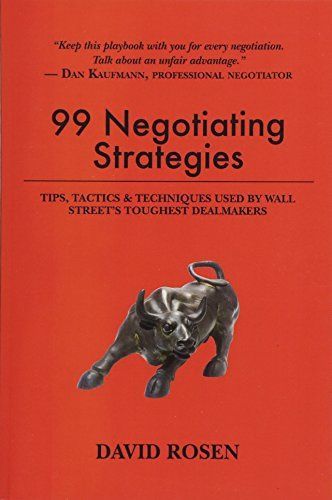
99 Negotiating Strategies Tips, Tactics & Techniques Used by Wall Street's Toughest Dealmakers
This is the most complete catalogue of cutting-edge negotiating tactics ever published. This blockbuster work is written as a playbook, a field guide, so lawyers, sales professionals and other dealmakers will actively use it as negotiations proceed. Use the tactics individually or in combinations. Swap them in and out as negotiations proceed for maximum effectiveness, to keep your adversary off balance, to calm them, or to close the deal. Negotiations are fluid and the mood can change. Sticking to a single approach can lead to deal failure. Rosen says a superior negotiator always adjusts as a deal progresses, just as a winning coach makes in-game adjustments. There is no filler here. There are no war stories. This is not a biography of David Rosen's career. It is exactly what the title says - an easy-to-use directory of powerful negotiating tactics. Each technique is succinctly explained, many with useful examples. The descriptions range in length from a single paragraph to a few pages. While there are many very sophisticated principles at work in Rosen's catalogue of techniques, each is simply explained. This is not an academic work. It is a tool, a device, just like a notepad, a pen or a calculator, for dealmaking pros to reference constantly. Rosen gets high marks for his opening discussion of ethics. The tactics he compiled here are extremely powerful, and readers should use caution in deciding how to apply them. Some incorporate powerful psychological principles and are proven to work based on decades of heavy academic research. To quote Rosen from the book's Authors Note, "Some negotiators may find ideas in this book too aggressive, but that is a matter of perspective. It is not a matter of right versus wrong, or ethical versus unethical. One may be a principled and hardcore competitive negotiator or an unprincipled, unethical collaborative negotiator. So a given negotiator's description of a tactic as too "aggressive" is really nothing more than his or her marking of the spot on the style continuum beyond which he or she no longer feels comfortable. Another negotiator might feel discomfort far short of that first negotiator's comfort spectrum. Others still may feel no discomfort even at the extremes." Who will benefit from this collection of advanced strategies? Lawyers, negotiators, sales organizations and sales professionals, business owners, mediators, and anyone involved in negotiating, dealmaking, selling, cold-calling, following up and closing deals. What will you learn? A small sample of the dozens of tactics: motivating others to buy, sell or reach other agreement; overcoming objections; creating or deflating a sense of urgency; helping opposing negotiators sell your deal to their own clients; overwhelming the opposition; and strategic uses of silence and indecision. But Rosen takes you far beyond that, and far beyond the other, generic books on the market. He introduces you to deeply-researched psychological principles, such as Prospect Theory, Coase Theorem, Asch Conformity principles and concepts like reciprocity, scarcity and consistency. Each is simply explained in a way that teaches you how to use them to achieve superior outcomes. Other books on negotiating don't even address these critical topics. Rosen explains them and shows you how they work. Buy this guide, study it, and keep it with you. There are so many potent and compelling techniques that you'll never remember them all. One thing's for sure, however. Once you become familiar with Rosen's easy-to-understand strategies, you'll never negotiate without this book again.